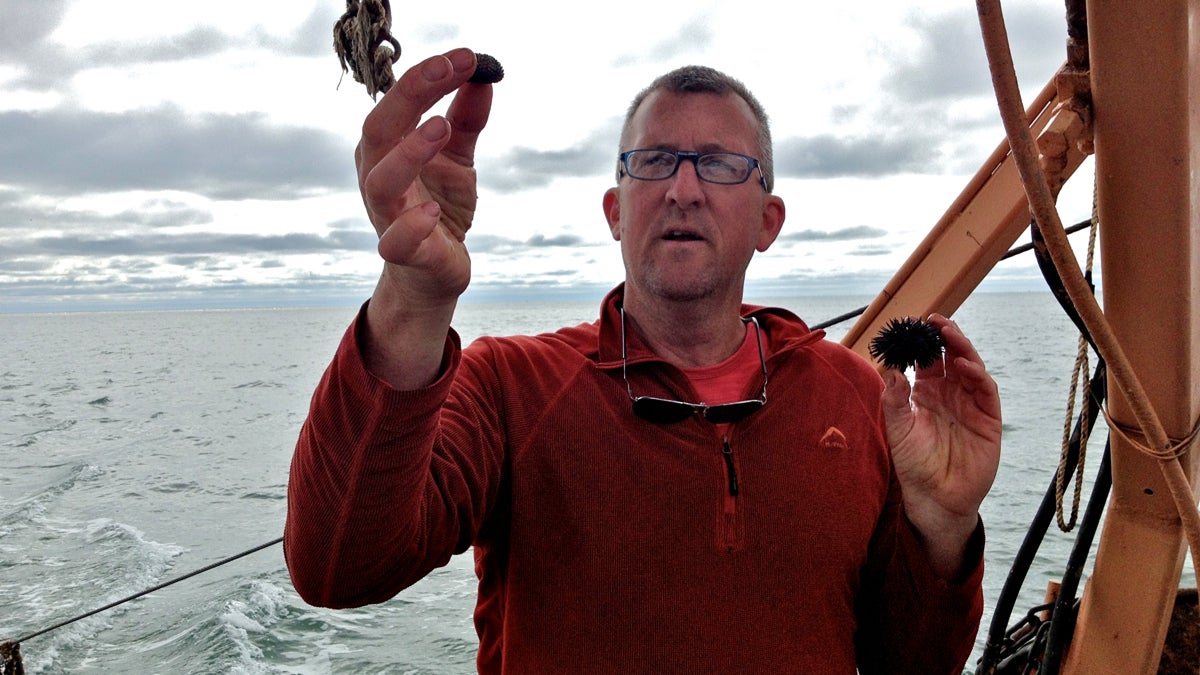Weird science jobs: grocer of the seas
Listen
David Remsen aboard the Marine Biological Laboratory's research vessel off the coast of Cape Cod. (Carolyn Beeler/WHYY)
In February, a British engineer announced he had found the strongest natural material on Earth, the teeth of a type of sea snail called the limpet.
The discovery could inspire the invention of a super-strong man-made material, and add to the list of scientific breakthroughs owing their start to research on sea creatures.
Scientists already know more about the nervous system, HIV and cancer from studies on squid, sea squirts and clams.
Before they can even start studies like these, though, someone has to get marine animals out of the sea and into their labs.
Grocer of the seas
At the Marine Biological Laboratory in Woods Hole, Mass, that someone is David Remsen.
Remsen is the kind of sea-ready East Coaster who wears shorts and sunglasses on a research boat when everyone else is wearing a coat. He oversees a team that catches, stores and raises marine animals for biomedical researchers at the lab to study.
Remsen grew up in Woods Hole, a town on Cape Cod that has a population of about 800 but boasts six major marine research institutions.
“You can’t swing a stick without hitting a marine biologist of some kind around here,” Remsen said. “I just was exposed to this my whole life.”
Remsen credits a summer science school in Woods Hole with igniting his passion for marine biology.
“What better way [to get interested in science] than mucking around with a bunch of seven year olds in the swamps and on the beaches, getting dirty and showing off in front of your friends picking up critters?” Remsen said.
Remsen came back to Cape Cod to work during the summers in college, putting in time milking horseshoe crab blood for use in a pharmaceutical extract that detects bacterial contamination in drugs and medical devices.
Now, he is back in Woods Hole, working out of an office, floors above a large warehouse fed with fresh sea water piped in from the ocean. The tanks there are full of sea squirts, sea cucumbers, fish, rays, squid, sharks and crabs ready for researchers to take back to their labs.
“As I describe myself, I’m a glorified grocer,” Remsen said. “The shelves…are full of marine animals, and instead of shopping carts, people come shopping with buckets.”
Marine animals a window to view biological processes
Much of the research at the Marine Biological Laboratory focuses on reproduction and development, so a lot of the collecting happens in late spring and early summer, when specimens are full of eggs but haven’t yet spawned.
After collecting them, Remsen’s team places them into cool water to delay spawning.
“When they’re ready to be used, a researcher will come, they will then warm them up to what is the normal temperature,” Remsen said, “and they spawn and then they can get the eggs and embryos at the (right) stage.”
Historically, marine animals have provided scientists important lessons in reproduction and development, partly because they are fertilized and mature in the ocean instead of in their mother’s wombs. Remsen said that makes it easier to observe their fertilization and development.
Today, Remsen said, a wide variety of marine animals serve as models for scientists looking for treatments and cures for human ailments. They study sea squirts that can repair nerves after they are severed, and sea cucumbers that re-grow their digestive organs after ejecting them to distract predators, looking for insight into how they may someday be able to regenerate human tissue.
Remsen serves not only researchers in Woods Hole, but ships everything from sea urchins to cuttlefish to scientists around the world, powered by an excitement for what the underwater world can teach us about life on dry land.
“It’s just fascinating that as one learns about the natural history of the organism, and as these different species exhibit all these different strategies for living, that they can be used to improve our understanding of life in general and in the human condition,” Remsen said.
This disclosure: Carolyn Beeler interviewed David Remsen while she was on a fellowship funded by the Marine Biological Laboratory.
WHYY is your source for fact-based, in-depth journalism and information. As a nonprofit organization, we rely on financial support from readers like you. Please give today.



